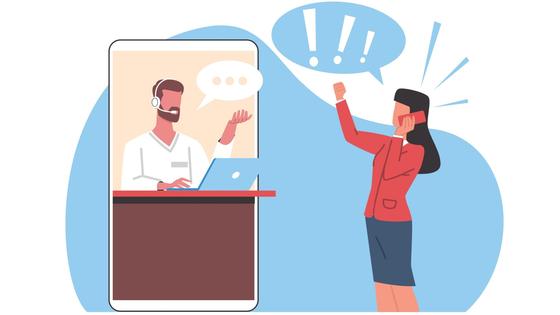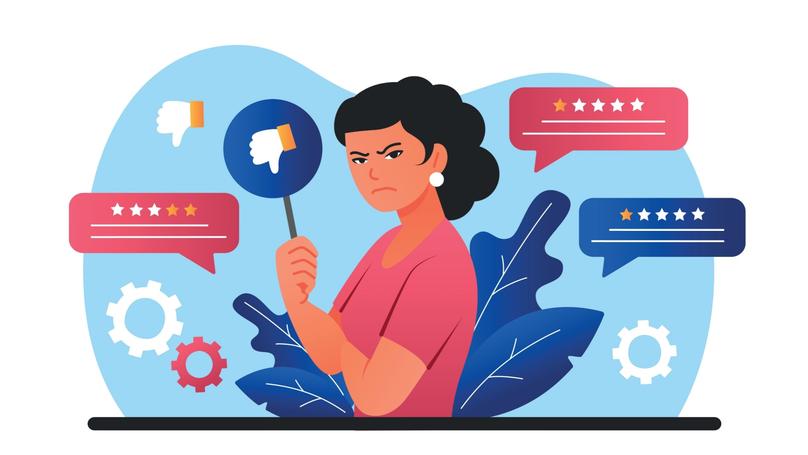Defeating the Dragon: How to deal with a difficult client
Sooner or later, you will have to face a difficult client. This doesn't pose any threat.

Instead, it's a common occurrence in the life of every manager or business, and it's wise to be prepared ahead of time. It doesn't matter why a client is "difficult." It could be because they are having a bad day, because of their circumstances, or their natural character. To be fully prepared for this, there's no better way than reading our article.
Surprisingly, the most challenging aspect of dealing with a difficult client isn't the impact on your reputation and productivity but rather the stress it induces. Due to these factors, a manager may find it challenging to maintain respectfulness and sociability, even with significant effort, as the human psyche, while adaptable, is not as malleable as plasticine. At times, our emotional well-being can develop cracks; it's essential to cultivate robust emotional intelligence skills to prevent this. (By the way, our course "Emotional Intelligence for Personal and Career Success" provides excellent assistance!), It is also a well-learned behaviour script. In short, an action plan for effectively dealing with difficult clients and understanding the different types and how to interact with each of them.
Six different types of difficult clients

Although everyone is different, with their own unique problems and needs, almost any difficult client can be categorised into one of 6 types:
- "I know best"
This is the same person who is convinced that they have already figured out everything, checked it out and tried it, that the manager is only wasting their time by asking additional questions. Likewise, only inexperienced professionals are available, making it unlikely that they can help them. The most effective tactic when dealing with this kind of client is to use the word "please" as much as possible in your responses and requests instead of asking questions." For instance, instead of asking 'When was the last time you tried to log into your personal account?" you could phrase it as "Could you tell us about your most recent login to your personal account, please? "When such individuals are questioned this way, they tend to exhibit greater calmness and politeness.
- "I want to complain"
The objective of these clients is not merely to find a solution to the problem at hand but rather to seize the chance to voice their complaint and, perhaps, gain some consoling bonuses or privileges as a result. These individuals exhibit strong self-focus and dissatisfaction, making it crucial to listen patiently and allow them to express their complaints until they naturally tire of doing so. Practice active listening by focusing on the positive aspects of what they say and expressing empathy.
- "Allow me to do everything myself"
This client category can also be called a 'micromanager.' This individual is convinced that they know the solution to the current situation, even if you inform them that it is impossible to implement. These individuals exhibit a unique blend of stubbornness, hard work, and diligence. They refuse to accept "no" as an answer and are determined to prove you wrong, too. These clients also tend to provide instructions and criticism of proposed solutions, even when those solutions are objectively sound. In this scenario, your best approach is to continue presenting alternative solutions and highlighting their positive aspects until the client chooses one. Additionally, consider encouraging the client to offer you regular feedback as the solution evolves. This approach can give them a sense of control, which is often essential.
- "You make my life hell"
Or, to put it simply, a 'drama queen.' This particular type of challenging client excels at sapping mental and emotional energy. They are remarkably dramatic and impulsive, with their primary craving being attention. Regrettably, employing the strategy outlined in point two will prove ineffective in this scenario. Regardless of how attentively you listen to the "drama queen," they will persistently whine. Your objective is not to allow this client to speak out freely. Instead, focus on identifying the logical essence in their words-the underlying trigger that genuinely excites them. You can't "spin" the situation with your empathy. Instead, on the other hand, you need to show composure and find a way to help physically, not emotionally.
- "I agree to everything... Or not?"
Who said that difficult clients only go berserk or become hysterical? Even the most pleasant and composed individuals who agree with everything you say can pose challenges. This is a problem with this type: despite initially appearing to agree with you, this client ultimately rejects the proposed solution or deal or leaves completely. Initially satisfied, this individual ultimately writes a lengthy and negative review on social media. In this situation, the best approach is to persistently acknowledge their issue and upset whilst expressing understanding, even if the other person doesn't outwardly display their upset feelings. Engage in a thorough discussion, focusing on the details, until you sense genuine interest and a sincere response.
- "I don't care what you suggest; I'm just looking to humiliate you"
This individual is so unpleasant that you wouldn't even wish them to work with your worst enemy. It's futile to seek an approach with this individual; they exhibit unwarranted aggression toward you, the company, and any proposed solutions. Individuals who refuse to reason sensibly in this situation do so because they don't want to. Here, you will have to "be a whipping toy" for this kind of person and their reason for visiting, or you could refer them to a more experienced and superior professional whose authority can overpower the authority of the client (in their own eyes since this client initially comes brimming with self-confidence). However, it's important to consider that engaging in open confrontation with them can be costly for you. It's likely not a worthwhile endeavour.
An action plan for dealing with difficult clients

The first crucial step when working with any client is to initiate a conversation about conditions and expectations. This must be done before your cooperation begins and before problems arise with the client. This approach allows you to promptly minimise the risk of misunderstandings and ensure high-quality and uninterrupted work with clients. At this initial "pre-launch" stage, it is vital to discuss details such as deadlines, time constraints, preferred methods of communication, frequency of meetings, additional contacts, etc. For instance, it's essential to have a prior discussion about potential issues. You can provide your direct phone number for immediate contact if any problems arise.
Additionally, inform the client that the next project meeting is scheduled for the end of the month. This proactive communication ensures the client's confidence and peace of mind about working with you. By proactively addressing the needs of a difficult client, you can prevent them from exhibiting their challenging behaviour. Nonetheless, suppose you have bypassed this initial stage and are facing a difficult client who's already at your doorstep, breathing fire. In that case, it's unfortunately too late to negotiate the terms. Here, you will have to start immediately with our advanced plan. The steps are the same for any client because you only have to determine their type to understand what tone you should follow in your communication. The plan is universal - so start it immediately!
1. Provide feedback to the client as quickly as possible
As a general practice, when working with clients, the initial interaction often begins with them reaching out to you. This could be, for instance, a letter of complaint or a job application. Replying immediately is not always a good idea, particularly if you are tired or need to coordinate and clarify something before reading. However, promptly inform the client that you are reviewing their issue and will contact them soon. 90% of customers report the importance of receiving an immediate response. Another 58% have refused to work with a company at least once because they did not like the time it took for them to receive a reply. Given the fast pace of modern life, today's consumers live under time pressure and consequently have high expectations regarding response time.
Establish a connection with a client database management system to ensure prompt client responses. This system gathers information about all your clients, including their past inquiries, history, and problem areas. This enables you to promptly identify who is seeking assistance and guide the client directly.
2. Provide the client with effective conditions for communication and interaction
No matter why the client is difficult or what issue, project, or problem they come to you with, it would be best to focus on fostering a trusting and strong relationship with them. For this, you must:
-
Always prioritise face-to-face meetings with the client unless they specifically request otherwise. Additionally, please pay close attention to their non-verbal behaviour, including gestures, posture, and facial expressions. You can use NLP techniques taught in the "NLP in Sales. Powerful psychological techniques" course to influence and read nonverbal cues properly.
-
Always prioritise giving the client as much time as they request. During communication with them, ensure you remain undistracted by other employees or tasks. Additionally, consider dedicating the initial few minutes of the conversation (if the issue isn't urgent and the client is moderately challenging) to pleasant abstract topics that resonate with the client, such as their vacation, preferences in drinks (offer to bring coffee, for example), etc.
-
Ensure that you feel comfortable yourself. It's essential to be well-rested, well-fed, and emotionally grounded, as the client's well-being relies on your state and your ability to address their concerns in a balanced manner.
3. Find out details and show interest
If a client complains about something, you must understand the genuine reason for their anxiety. If a client approaches you with an order or proposal, it's crucial to discern their deeper needs. In both cases, you must gather as much information as possible about the client and his situation and then examine it. To successfully address this situation during a live conversation, engaging the client and demonstrating genuine interest in resolving their issue is crucial. Winning them over is key.
-
Ask clarifying questions. Especially if you do not understand something, and not just to demonstrate empathy. When dealing with a client who tends to be reserved and hesitant to share details, prioritise open-ended questions. Conversely, opt for closed questions if the client tends to be verbose and scattered in their thoughts.
-
Do not interrupt the client and allow them to express all their thoughts and the available facts fully.
-
Pay close attention to details mentioned in passing. Although these details may appear unimportant to the client, they could potentially be at the core of their problem.
-
When interacting with a client, briefly share your relevant experience. Let them know that you've encountered similar issues in the past or have personally faced such problems. This approach simultaneously provides two pieces of good news for the client because you understand their feelings and know what to do.
Lectera’s Online Courses by topic
4. Develop and propose a solution
When you possess comprehensive information about the client's desires, requests, problems, and true needs, blend them together like the ingredients of a potion to find a solution. It is not a fact that it will immediately satisfy your client because it is complex. Likewise, it's not guaranteed that you won't need to revisit the previous stage or even start from the beginning to clarify points further and optimise your proposal. You'll require both emotional intelligence and persuasion skills, as well as ample time and patience.
If the client does not agree to a proposed solution, take the time to understand their reasons. Then, consider how you can adjust certain points to reach a compromise. When the client is mistaken, present well-reasoned arguments highlighting their error. However, avoid using the harsh and negative term "mistake!" Approach the situation not as an argument but as an opportunity to shift conviction. Communicate from the standpoint of 'You are right, and I have insights to enhance your perspective and improve the outcome.
Important! Ensure that all agreements, new conditions, and relevant details are documented in writing. In this way, you will officially secure their agreement and provide yourself with a form of "insurance" if the client later forgets what they initially agreed to during subsequent discussions.
5. Release your emotions safely (not near the client!)
After implementing the steps mentioned above, you may experience fatigue, irritability, and possibly anxiety or overwhelm. This is fine. Working with people is always stressful, especially if they are difficult and problematic individuals. Following interactions with such clients, it is advisable to take a break. Step outside the office, breathe in the fresh air and shift your focus from mental exertion to physical activity. For example, have lunch, exercise in the playground, pet the office cat, etc. Congratulating yourself for the work you have done, regardless of the result, is also very important. If you are grappling with intense negative emotions and need guidance on managing them effectively, read this article.
6. If necessary, say "no" (optional)
As a manager or business owner, it is difficult to say "no" to a client because the market is full of competitors, and someone will likely snatch even this type of client away. You must understand that dealing with difficult clients often consumes significant time and energy. Alternatively, you might choose to channel that effort into addressing more pressing and fulfilling matters or fostering connections with loyal and dependable clients. It's vital to objectively assess the advantages and drawbacks rather than letting irrational fears of job loss or reduced profits influence your decision-making. If you objectively understand that this client takes more than they give, consider skipping the previous steps or at least performing them only once. If the client refuses, well, it's their right.
In business and any career, learning from mistakes is extremely important. It's always easier to prevent situations than to solve them. Suppose you are consistently dealing with difficult clients. In that case, it's worth considering that the issue may not lie solely with the clients themselves. Instead, it could be related to shortcomings in product, service, or collaboration. Enhance service quality, analyse individual and company-wide performance, and optimise internal processes to ensure customer satisfaction, regardless of their character. Examining how you work with the most difficult individuals is also essential and beneficial, by the way!
Share this with your friends via:
Latest News

A significant stage in the development of the alternative education system has begun in West Northamptonshire in the UK: the County Council is actively calling on parents, guardians, and trustees to participate in shaping the future of this key area.

Outwoods Primary School in Atherstone, Warwickshire, having experienced deep sadness after the loss of their famous cat, Silla, has found solace in a new pet – a Maine Coon named Aloysius O’Hara.

In modern universities, artificial intelligence, and in particular ChatGPT, is rapidly transforming from a controversial tool into a full-fledged student assistant.

An innovative educational project is gaining momentum in UK primary schools, aiming to change attitudes towards video games.

The Massachusetts Institute of Technology (MIT) presents MIT Learn – a revolutionary online platform that opens a “new front door” to access university knowledge and resources.












 Test. Check Your Social Media Dependency Level!
Test. Check Your Social Media Dependency Level!
 Test: What Business is Right For You?
Test: What Business is Right For You?
 “I’m Here for the Long Haul”: When Loyalty to a Company Becomes Toxic
“I’m Here for the Long Haul”: When Loyalty to a Company Becomes Toxic
 Test: How Prone Are You to Abusive Behavior as a Manager?
Test: How Prone Are You to Abusive Behavior as a Manager?
 Test. What superpower would you possess if you were a superhero?
Test. What superpower would you possess if you were a superhero?
 Test. What Should You Let Go of Before Winter Ends?
Test. What Should You Let Go of Before Winter Ends?
